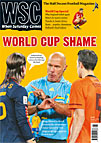 Roger Titford analyses how the role of the crowd is changing, thanks to television's demands
Roger Titford analyses how the role of the crowd is changing, thanks to television's demands
My abiding memory of the 2002 World Cup is the rhythm, uniformity, noise and collective willpower of the South Korean crowd. In France 1998 the way England fans dominated some stadiums with flags and song was impressive but the South Koreans took it to another level – and reached the semi-finals. South Africa 2010 has been a very good tournament with lots of smiling faces. But it’s been two steps backwards in undermining the role of genuine, traditional support which is about being united and getting behind your team.
For the match-going fans there is always plenty of pre-tournament hand-wringing about venues, security and transport. There’s never any debate about the means by which the vast majority will get to watch the tournament. It’s one set of pictures, no choice of commentary, just volume up, down or off. Little decisions on how to cover matches can be enormously influential for the way the sport sees its supporters and the way we see ourselves. Two aspects of this tournament are diminishing our collective role – while boosting some individuals’ private self-fulfilment.
The vuvuzela is the local equivalent of the air-horn heard at motor sports. It is in unpractised hands just basically farting, a thousand times louder. How do the players, your players, take encouragement and gratification from that noise? For very little effort it obliterates the chants and songs of the rest of the crowd and destroys, for me back home admittedly, a valuable part of the interplay between the crowd, the TV viewer, the action and the commentator. Hearing fans at the match gives me another narrative to follow that is in some senses more realistic than the commentary. Instead we’re left with the leaden bombast of Peter Drury broadcasting from inside a jar of wasps. At first, viewers complained and there was talk of banning vuvuzelas (as Borussia Dortmund will do next season). Issues of unenforceability and cultural oppression made that a non-starter. So for now this is the sound of international football and there are people in the crowd wearing ear-protectors to prove it. The commentators and pundits were not open about how they regarded the impact on their working conditions but one had the frequent sense of them smiling through gritted teeth.
As equally irritating was the increased frequency of cut-away shots to individual crowd members. TV just wants to see clowns, cleavages and celebs on the big screen. The average gap between being picked out and realising this appears to be a couple of seconds. It makes you wonder how often people are looking at the screen rather than the game. Your country’s hopes may be going down the pan but your costume choice has been validated. There is a self-reinforcing loop here – the more people get on the big screen the more such people will want to go along specifically to be picked out. Not the selfless support of the South Koreans but the selfish desire of individuals chasing a flicker of fame. And how is a viewer supposed to react to a cut-away of Angela Merkel gladhanding the VIP box? If it’s not part of the game story, it’s an interruption. On the pitch the power of teamwork has proved superior to the elevated reputations of superstars. Off the pitch, ironically, TV is endorsing a self-regarding manner of “support” more in tune with the motives of a carnival parade. You are still part of the event but in a very different, non-sporting way.
From WSC 282 August 2010